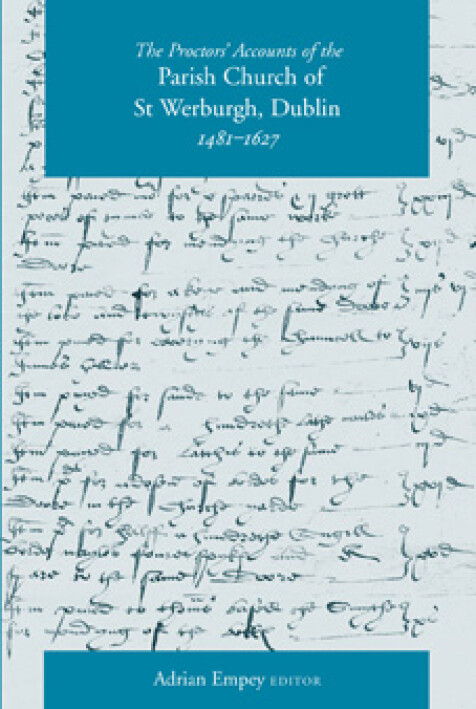The Proctors' accounts for the parish church of St Werburgh, Dublin, 1481–1627
Adrian Empey, editor
'One can be deeply grateful for the extensive glossary which gives substance to English words no longer in common usage. These are unique documents, insofar as nothing comparable is known to exist in Ireland … this book will be of great value to future historians and warrants a place in the history section of libraries. The series’ editor should be encouraged to continue his good work', Victor G. Stacey, Church of Ireland Gazette (January 2010).
‘St Werburgh’s church is one of the oldest and most significant in Dublin. It is unique in that the proctors’ accounts have survived, unlike every other parish in Ireland. The proctor was a lay officer who was responsible for much of the church’s financial arrangements … it might seem that ledges of revenue and expenditure would be dull stuff but they tell us a lot about the development of the Church of Ireland in these centuries – the pace of change in the church after the reformation and the extent to which lay members of the parish participated in the church’s affairs. The proctors’ accounts give us details of the individuals involved with the parish in different capacities over the centuries. A useful book for the historian of the period, making more accessible a unique source', Books Ireland (January 2010).
‘While the accounts themselves for the ordinary reader may seem strange and uninformative, the editor’s long introduction provides full enlightenment of how meaning is extracted from them, and what they mean for our growing understanding of the religious changes in Ireland, especially under Queen Elizabeth. For the increasing number of those fascinated by the history of our most important city, Adrian Empey provides unusual insights into a nearly lost past', Peter Costello, Irish Catholic (April 2010).
‘Empey, secretary of the Church of Ireland Historical Society has done historians a great service in transcribing the proctor’s account books from 1481–1627 from St. Werburgh’s church in Dublin. The proctors, or church-wardens, were lay representatives of the parishioners, responsible for managing funds, recording donations and paying for repairs and wages. The long term of these records also enables historians to chart changes in prices, lay participation and church property. Empey gives a comprehensive introduction that explains the role of the proctors in Ireland as well and England and on the continent. Having a printed text of the valuable document will allow scholars to compare daily activity with other parishes in Europe. Social historians will also benefit from the records of day-to-day activities in the parish', Reference & Research Book News (May 2010).
‘Adrian Empey is to be warmly commended for editing and publishing this unique series of proctors’, or churchwardens’, accounts for an Irish urban parish. It represents another major contribution by him to the study of the Church in late medieval Ireland, and it will undoubtedly stand the test of time. In his introduction, Empey provides a detailed discussion of the development of the medieval parish of St Werburgh, Dublin, and he traces the development of the office of churchwarden in Ireland, so far as the evidence allows, from the first half of the fifteenth century … Irish Church historians are greatly indebted to Adrian Empey for publishing this sterling work. Its significance, I would suggest, is greater than he modestly asserted', Henry A. Jefferies, Irish Historical Studies (Autumn 2010).
‘The editor has provided us with a veritable treasure-house of details about everyday life in this urban parish and in its church with an exotic Anglo-Saxon female dedication. A valuable part of this treasure, easy to overlook, is linguistic, for these accounts were drawn up mainly in contemporary English, with only occasional recourse to Latin. We shall remain in Dr Empey’s debt for having made readily and reliably available so much new material for further historical research', Howard B. Clarke, Search: a Church of Ireland journal (Spring 2011).

